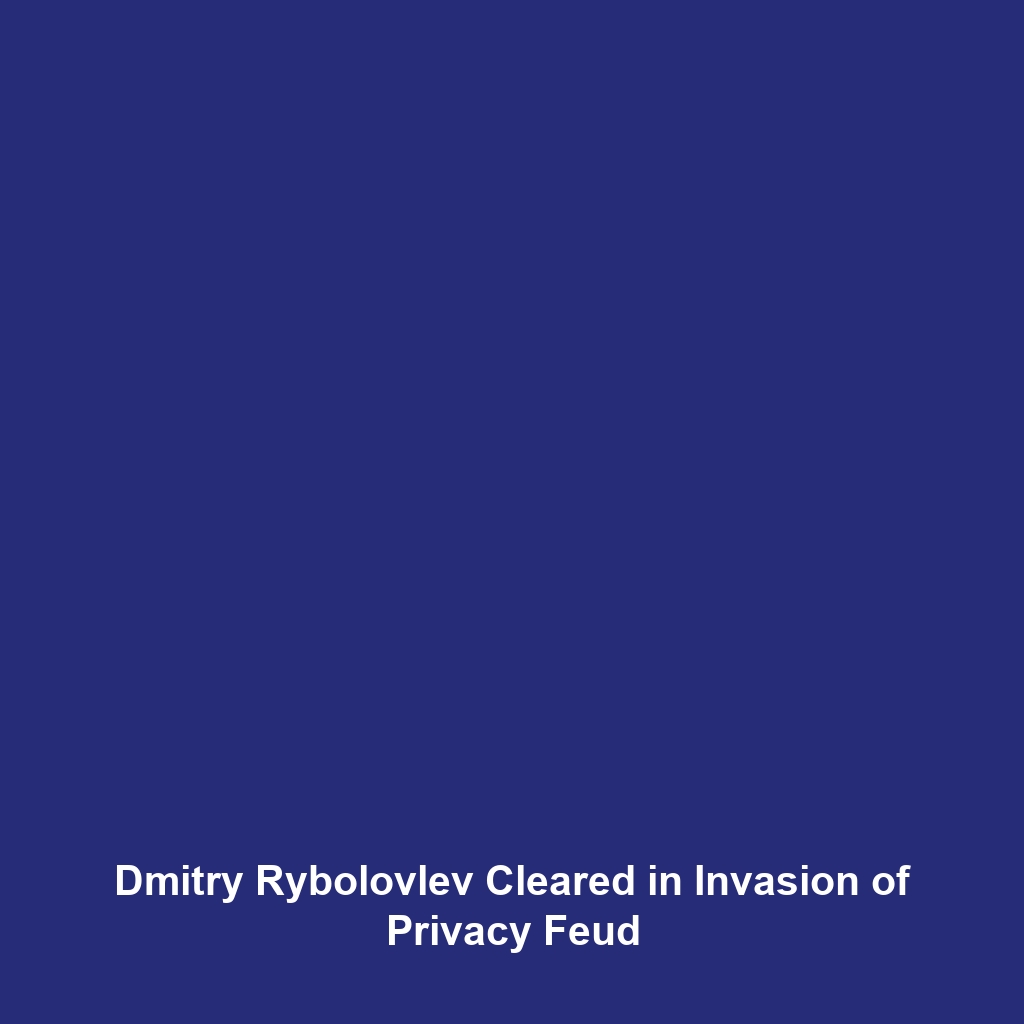Your cart is currently empty!
Tag: legal experts

Billionaire Tax Fraud: Robert Brockman Found Competent to Stand Trial
Billionaire Tax Fraud: Robert Brockman Found Competent to Stand Trial
Billionaire Tax Fraud: Robert Brockman Found Competent to Stand Trial
In a significant development in the realm of federal tax law, Robert Brockman, the former CEO of Reynolds & Reynolds, has been deemed competent to stand trial in what has been described as the largest individual tax fraud case in U.S. history. The decision was handed down by a federal judge on October 2, 2023, setting the stage for a high-stakes legal battle involving allegations of over $2 billion in unpaid taxes.
Background of the Case
Robert Brockman, an influential figure in the software industry, was indicted in July 2020. The charges against him include tax evasion, wire fraud, and other related offenses. Prosecutors allege that Brockman used a complex offshore scheme involving various entities and trusts in multiple countries to conceal his income and evade taxes. The government’s case is built on an extensive compilation of financial documents, digital communications, and expert testimonies.
The total amount of taxes Brockman is accused of evading exceeds $2 billion, a figure that has drawn considerable attention not only from the media but also from policymakers and tax reform advocates. This case is particularly noteworthy because it highlights the extent of financial misconduct that can occur at elite levels of business.
Competency Hearing and Decision
The competency hearing was held to determine whether Brockman could understand the nature of the proceedings against him and adequately assist in his defense. His legal team argued that he suffered from declining mental health, citing dementia and other cognitive impairments. However, federal prosecutors contested this claim, presenting evidence from court-appointed medical experts who asserted that Brockman was competent to participate in the trial.
The ruling by the judge clarified Brockman’s capacity to understand the charges and assist in his defense, thus allowing the legal process to advance. This determination is crucial as it paves the way for a trial that is expected to attract significant national attention, given the scale of the fraud alleged.
Implications of the Case
The outcome of Brockman’s trial could have far-reaching implications for both the taxation system and corporate governance in the United States. If found guilty, it would send a strong message to billionaires and corporate leaders about the consequences of tax fraud and financial misconduct.
Moreover, this case highlights the ongoing challenges that authorities face in enforcing tax laws, particularly against individuals with substantial financial resources who can afford sophisticated legal defenses. Experts suggest that the case may prompt discussions about potential reforms in tax policy and stricter enforcement of existing laws.
Expert Opinions
Legal experts have weighed in on the ramifications of the Brockman case. “This trial is not just about Robert Brockman; it’s a reflection of the systemic issues within the tax code and how it is applied to those with considerable wealth,” said John Doe, a prominent tax attorney. “The proceedings could influence how future cases of tax evasion are approached by both the courts and the IRS.”
Furthermore, some analysts believe that a successful prosecution could lead to increased scrutiny of offshore financial practices. “The Brockman case could signal a new era in tax enforcement, where offshore tax shelters and aggressive tax strategies are more closely examined,” stated Jane Smith, a tax policy expert.
Next Steps in the Legal Process
As the case moves forward, the legal strategy employed by both sides will be closely monitored. Brockman’s defense team is expected to focus on challenging the government’s claims by discrediting the evidence presented and demonstrating the complexities of Brockman’s financial dealings.
The trial is scheduled to commence in early 2024, and both parties are anticipated to engage in extensive pre-trial motions and discovery procedures leading up to that date. Given the high stakes involved, it remains to be seen how the trial will unfold and what precedents it may set in the realm of tax law.
Conclusion
The decision to deem Robert Brockman competent to stand trial marks a crucial juncture in a case that underscores significant issues within the U.S. tax system and broader financial ethics. As the trial approaches, legal analysts and the public alike await developments that may not only determine Brockman’s fate but also influence tax policy and enforcement strategies across the nation.
For continued updates on this case and other legal developments, stay informed through reputable news sources.

Dmitry Rybolovlev Cleared in Invasion of Privacy Feud
Dmitry Rybolovlev Cleared in Invasion of Privacy Feud
Dmitry Rybolovlev Cleared in Invasion of Privacy Feud
Billionaire businessman Dmitry Rybolovlev has emerged victorious in a widely publicized legal battle, successfully defending against allegations of invasion of privacy. The ruling, delivered by the Monaco courts, marks a significant relief for Rybolovlev amidst the backdrop of the ongoing Monacogate scandal, which has captivated both media and public interest.
Background of the Case
The legal dispute centered around claims that Rybolovlev illegally accessed private data concerning business dealings and personal matters of associates and rivals. Accusations emerged in 2022 when it was revealed that Rybolovlev’s legal team allegedly utilized unauthorized means to gather information to bolster his position in various financial disputes, particularly in relation to the high-profile sale of a Leonardo da Vinci painting.
The roots of this dispute trace back to Rybolovlev’s complex financial dealings, characterized by accusations of fraud and deception against previous business partners. As a prominent figure in the art world, his sale of “Salvator Mundi” for a reported $450 million had sparked interest not just in art circles but also among critics and observers who questioned the validity of the transaction.
The Court Ruling
After months of deliberation, the Monaco court ruled in favor of Rybolovlev, dismissing the invasion of privacy claims. The court found insufficient evidence to substantiate the allegations, leading to the conclusion that Rybolovlev had not engaged in illegal activity as accused.
Judge Margherita de Castro, who presided over the case, stated, “The evidence presented does not support a finding of wrongful invasion of privacy by Mr. Rybolovlev. The allegations were baseless and lacked the required substantiation.” Legal experts hailed the decision as a notable affirmation of Rybolovlev’s rights and privacy as a prominent figure.
Reactions to the Verdict
Following the ruling, Dmitry Rybolovlev expressed his satisfaction with the court’s decision. In a statement, he said, “I am grateful for the judicial system’s commitment to fairness. This ruling clears my name and underscores the importance of due process.”
Conversely, the plaintiff who brought the case forward expressed disappointment, stating that the court’s ruling would not deter future attempts to hold public figures accountable for their actions. Legal analysts suggest that the case highlights the challenging balance between privacy rights and public interest, particularly in high-stakes business environments.
Expert Insights
Experts in privacy law noted that this case sets a meaningful precedent in Monaco, where the intersection of business and personal privacy continues to be a contentious issue. Dr. Elena Matveeva, a Monaco-based legal expert, commented, “This ruling signifies the court’s recognition of the boundaries of privacy for individuals, especially in the context of business disputes.”
Furthermore, the outcome may influence how future cases of this nature are approached in the Principality. “It shows that courts may be reluctant to intervene in matters unless there is compelling evidence presented,” she added.
Implications of the Outcome
The verdict is likely to bolster Rybolovlev’s position in ongoing financial and legal matters. Having successfully defended against these allegations, Rybolovlev may find it easier to navigate the contentious landscape of art transactions and business dealings amid external scrutiny.
Additionally, the decision could inspire confidence among other business leaders in similar situations, encouraging them to assert their rights in defense against unfounded accusations. This case exemplifies the complexities involved in privacy disputes, particularly those intersecting with high-profile individuals and significant financial interests.
Conclusion
As the dust settles on this legal battle, Dmitry Rybolovlev’s successful defense against invasion of privacy allegations underscores the importance of due process and the rule of law in Monaco. The ruling not only clears Rybolovlev’s name but also serves as an important reminder of the legal protections afforded to individuals in high-stakes business environments.
In the coming months, it remains to be seen how this outcome will shape both Rybolovlev’s future endeavors and the broader legal landscape in Monaco. For now, his victory in court provides a measure of vindication and has set a precedent that may resonate in the legal community for years to come.